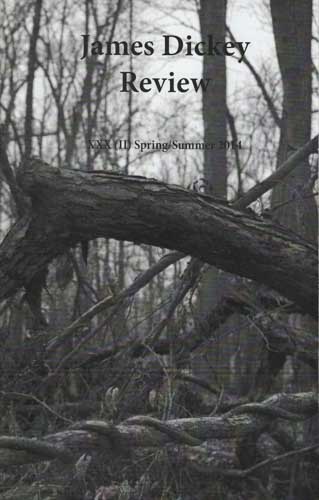James Dickey Review – Spring/Summer 2014
Published at Lynchburg College in Virginia, this review has roots in the South as deep as James Dickey’s. But while its content aims “to maintain an artistic and intellectual connection” to Dickey and his work, the interpretation is generous enough to allow for a good mix of Dickey scholarship, original poetry, essays not about the author but maybe concerning things he would care about, and book reviews. One might say the spirit of Dickey is hovering over the journal, so that, for example, the wilder shores of the avant garde or identity politics do not appear in this issue. We are in recognizable Dickey territory the whole way.
Published at Lynchburg College in Virginia, this review has roots in the South as deep as James Dickey’s. But while its content aims “to maintain an artistic and intellectual connection” to Dickey and his work, the interpretation is generous enough to allow for a good mix of Dickey scholarship, original poetry, essays not about the author but maybe concerning things he would care about, and book reviews. One might say the spirit of Dickey is hovering over the journal, so that, for example, the wilder shores of the avant garde or identity politics do not appear in this issue. We are in recognizable Dickey territory the whole way.
Don Johnson’s long poem, “North Georgia, Last Call,” starts us off traveling in a truck through Dickey’s ancestral landscape with the man himself riding shotgun. The poem proceeds through a carnival of the local talk beloved by Dickey (“Hell, you got to steal to break even.”) to a diner full of word play (“If there’s hog to be had, be the butt. / If you’re the pig, take the poke”) a welter of aphorisms, puns, a velvet Elvis, a quirky meditation on America, and a sassy waitress named Sheila. It’s a ride Dickey would have enjoyed. Next comes an ongoing feature of the magazine, part X of “From the Manuscript Vault: Aphorisms for Use in the novel Alnilam,” listed without commentary. The aphorisms follow naturally upon Johnson’s poem, sketching the nature of a charismatic man’s man.
The shorter poems include three by Duffie Taylor that play with the idea of life as language and vice versa (“Life is content to be a story; only when maneuvered / beyond the frame does the moment become / painful . . .”) and three by Kelly Cherry, including “Sonnet for a B-17” that speaks to Dickey’s military experience. Frank Light’s personal essay, “Tora Bora Redux,” also concerns military life, specifically his time in Afghanistan trying to bring American goodwill to a dangerous area that once sheltered Osama bin Laden. It is part of a memoir. There is room for student work like Benjamin Norman’s “Chrysopoeia: Metaphysical reflections on Transformation in James Dickey’s ‘The Owl King’,” and a poem from Ireland, “Animal Psalms” by James Patterson, that reminds us of Dickey’s illuminating grasp of concrete reality.
The gem is Ed Madden’s reminiscence, “James Dickey: In Touch with Darkness.” It begins, “This essay is not an act of revenge” and tells a story from 1997 at the end of Dickey’s life. Madden was a new assistant professor at South Carolina when Dickey succumbed to his final illness and was unable to teach his Verbal Composition class. Madden was tapped to replace him. He barely knew the author and was understandably nervous about filling such large poetic shoes. But this was not the worst of Madden’s problems. From his hospital bed, Dickey phoned Madden to threaten, “If you come on to any of my students, I’m going to come to your office and personally break your fucking neck.” Furthermore, Madden would receive the same treatment if he taught the work of “homosexual poets” or had “an ax to grind in the class.” Dickey died two days later. To speculate about the origins of this crazed threat from a womanizer who was fascinated by violence and by homosexuality, Madden goes back to Dickey’s writing and to Henry Hart’s biography of Dickey.
Three of the books reviewed appear to have an emotional connection to the South of Deliverance. Ricky Rodriguez notes the violence in Charles Dodd White’s Sinners of Sanction County (stories set in a violent Appalachia), in Jon Sealy’s novel The Whisky Baron (violent 1930s South Carolina), and Alabaman Emma Bolden’s poetry collection Maleficae (violence against women accused of witchcraft). In contrast, Cary Holladay’s gentler story collection, The Deer in the Mirror, is set in her own personal Virginia, which reviewer Robert Baker describes as “so compelling that it almost becomes a character itself.” Holladay is compared to Chekhov for her “capacious imagination that accepts the passions of her characters without judgment.”
This publication is of interest to Dickey scholars, Dickey fans, and people who know little about the man and his work, for it achieves the most important goal of journals specializing in a single author: it sends the reader back to the work.
[www.lynchburg.edu/james-dickey-review]





